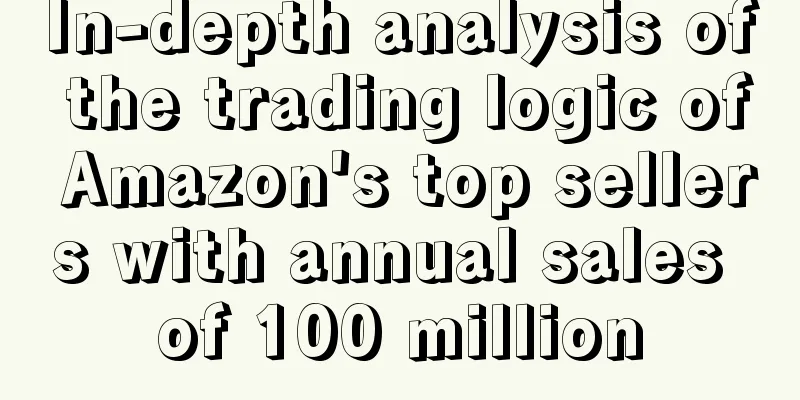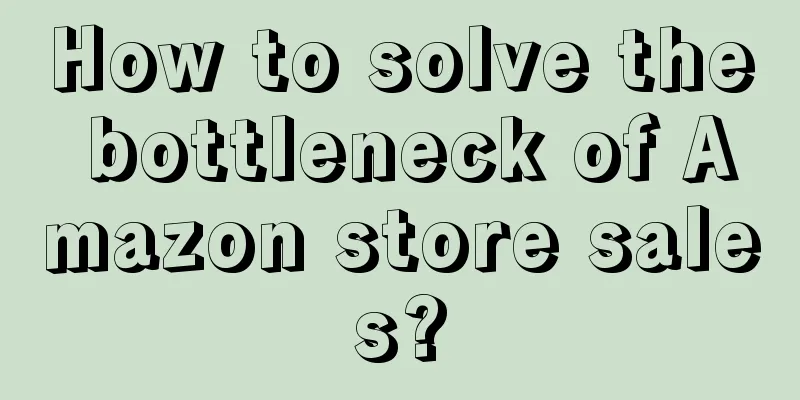In-depth analysis of the trading logic of Amazon's top sellers with annual sales of 100 million

|
Advertising is one of the important sources of traffic for Amazon products and is also the most popular operational strategy used by sellers when promoting products. But in most cases, the advertising effects of many sellers are not ideal. Sellers usually encounter these problems:
If things go on like this, the advertising won’t be effective, and there will be no natural traffic, and the vicious cycle will continue. The product will slowly begin to die, until it dies completely, and the dream of making the product a bestseller will also be shattered. If this scenario sounds familiar to you, you may have made these advertising mistakes: Many sellers use the same advertising strategy when their products are first launched and for a period of time after launch until the new product period has passed, and never make adjustments. In fact, this greatly reduces the effectiveness of the advertising. In product promotion, when placing advertisements, it is necessary to clearly identify the stage your product is in and adjust the advertising strategy accordingly. We know that products are divided into the new product stage, growth stage and mature stage. 1. New product period When a product is first launched, there will be a traffic support period of about 2 weeks. The purpose of advertising at this time is mainly to quickly determine the market demand for the product and to detect where the listing needs to be optimized. At this time, automatic advertising and manual advertising can be run together, and the bid is slightly higher than the bid recommended by the Amazon system. The new product period is the golden period for product creation. The advertising strategy is to use sufficient budget to open up the market, attract traffic on a large scale, and find accurate keywords for orders. 2. Growth stage After the product has passed its new product period, sales begin to rise continuously. At this time, the purpose of advertising changes from attracting traffic to ordering, so more emphasis should be placed on manual advertising. During the new product period, you can find some keywords that generate orders by exporting advertising reports, and then gradually transition these words from broad and phrase to precise, and gradually increase keyword bidding. When setting the bid for the product, it should be higher than the recommended bid. 3. Maturity If the sales volume of a product is stable and no longer showing significant growth, and the keywords have performed well based on previous advertising operations, you can lower the keyword bid appropriately and increase the budget as appropriate. This will have little impact on the ad rankings, and try to keep ACOS at around 10%, or even lower. As Acos is an important indicator of advertising performance, sellers naturally expect the lower the better. However, in fact, pursuing low Acos without considering the actual operating situation will only backfire. In actual operation, Acos has the following performances: 1. Acos value is less than product gross profit margin: This is the most ideal situation, which means that the input-output ratio of advertising is cost-effective. If the return rate is not taken into account, the advertising should be profitable at this time. 2. Acos value is equal to product gross profit margin: On the surface, advertising does not bring profits to operations, but if you compare the number of advertising orders, organic orders and total orders before and after advertising, the result obtained by subtracting the number of advertising orders from the total number of orders is very likely to be greater than the number of organic orders before advertising. That is to say, as the advertisement is released, the advertisement generates some orders, and the orders of natural traffic also increase. This is the blessing effect brought by the advertisement. Therefore, if the Acos value of your advertisement is exactly equal to the gross profit margin, this advertisement is still worth continuing to run. 3. Acos value is higher than gross profit margin: If the excess is not large and is within an acceptable range, there is no need to worry about such advertisements. But if it is too high and the Acos value still cannot be reduced after a period of optimization, then it is necessary to pause or stop the advertisement. Then find the reasons from the perspectives of Listing optimization, market demand, etc. This is also a common mistake made by many novice sellers. They think that automatic advertising is automatically matched by the system, so they basically don’t care about automatic advertising. Once you notice that automatic advertising is producing poor data, you should either pause the advertising or bid very low. In fact, it all comes down to the lack of systematic thinking and cognition about automatic advertising. In the early stages of automatic advertising, we must pay close attention to changes in data. It is normal for the initial data to be poor , but we must pay attention to monitoring changes and fluctuations in data over a period of time to find out the reasons for the fluctuations. Automatic advertising has very little control over traffic, and it is completely left to the algorithm to run, but it can give you the most intuitive feedback on market demand and listing health. Therefore, don’t ignore automatic advertising just because it is automatically recommended by the system. When placing advertisements, many sellers will focus a lot of energy on finding matching keywords, rarely study negative keywords, or even ignore them completely. Little do you know that those words with low CTR but no conversion, high cost but no conversion, and high clicks but no conversion are slowly eating up your budget , so you will feel that your budget is quickly burned out, but your Acos is getting higher and higher. Therefore, when optimizing advertisements, you should add the above words to negative keywords in a timely manner, and it is best to use negative exact, and try not to use negative phrases, otherwise it will have a greater impact on traffic. In terms of the optimization cycle, it is recommended to optimize once every one to two weeks. The above are all common mistakes made by sellers when placing advertisements, but in fact, Amazon advertising is a large module in the entire Amazon system. Depending on the sellers’ products and promotion strategies, the advertising strategies vary greatly, so many techniques and methodologies cannot be completely generalized here. |
>>: What happens to people who work at Amazon?
Recommend
What is Seller Fulfilled Prime? Seller Fulfilled Prime Review
In order to reduce the storage pressure, Amazon la...
Amazon Air expands daily cargo service to Wichita, USA!
It is learned that Amazon Air recently launched it...
The US government is going to give out money again? It coincides with the year-end peak season
The United States has experienced another major o...
What is an effective tariff? Effective tariff assessment
Effective tariff is a concept in modern internatio...
Amazon does not provide refunds for returns, and a large number of sellers are being fleeced!
As we all know, Amazon's "refund only, no...
What is Darfon Logistics? Darfon Logistics Review
Shenzhen Dafang Logistics Co., Ltd. provides globa...
Valentine's Day spending in the U.S. is expected to reach $185! What categories are the most popular?
According to data from the National Retail Federat...
Two-tier differentiation! Amazon verification treats new and old accounts differently!
During the May Day holiday, Amazon sent a large nu...
American consumers prefer "buy online, pick up offline"! They are enthusiastic about same-day delivery services!
<span data-docs-delta="[[20,"获悉,根据PYMNTS的“...
FedEx plans to lay off five warehouse employees after strike
FedEx will lay off 843 employees at five warehouse...
How to solve the problem of brand abuse displayed during brand registration or authorization?
What I want to share with you today is: How to sol...
How do Amazon sellers relist stranded inventory?
Managing inventory is a very important skill for ...
Biden says container congestion at U.S. ports has dropped by 40%! High inflation is expected to ease
It is learned that US President Biden delivered a ...
Sellers beware: Amazon releases new rules for EU agents, failure to comply will be considered illegal!
Recently, sellers are often seen asking in communi...
What is Octopus Cross-border E-commerce Logistics? Octopus Cross-border E-commerce Logistics Review
Octopus Cross-border E-commerce Logistics is an in...









